Free U.S. Shipping on Orders Over $40
-
Coffee
-
Merch
-
About Us
- Subscriptions
-
Wholesale
- Education
Free U.S. Shipping on Orders Over $40
August 14, 2018
Depending on how you count it, this will be our third or fourth year working to bring our model of on the ground purchasing to Kenya. Our drive to work directly in country, with producers, stems from the idea that sustainability is an individual problem to solve. We believe that in coffee it’s more impactful to change the world in a big way for a few producers than to try and change the world in a small way for all producers. The primary mechanism for us to do this is visibility. We find farmers who are exceptional and work to create demand for their coffees among our customers. This demand and producer level name recognition creates huge stability for coffee farmers. It also creates the relational foundation for implementing quality focused projects which lead to better coffee, prices, and demand for their coffees. But the first step is finding producers to work with.
Kenyan coffee, we’ve found, moves very fast through the supply chain. We have seen that the auction, being very structured, provides good visibility and enables producers to get paid quickly. The auction has also led to prices in Kenyan being more closely tied to cup quality and therefore some of the highest priced coffee in the world. The downside of the auction is that it is logistically difficult to purchase outside the auction and requires relationships at multiple points in the supply chain to source the same coffees every year.
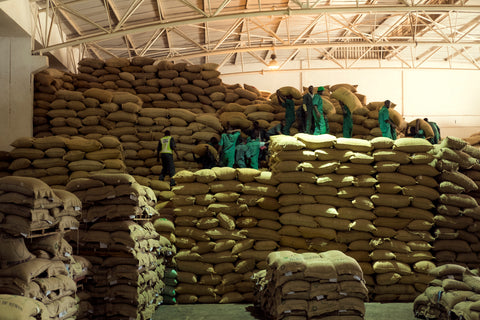
This year we visited a mill started by a German exporter/importer of Kenyan coffees. The name of the mill is Tropical, and the previous year we consistently saw coffees under their name on the auction board going for the highest prices and with the most fierce bidding. The particular week we were there was a record setting week, and the whole room kept erupting into cheers and euphoric chaos as again and again coffees broke through record setting prices. We were really impressed with the warm welcome and hospitality of the director of Tropical Mills; Danilo Pucci, who hails from coffee production in Brazil, and we saw tangible mechanisms behind the quality we expected to see based off their performance in the Nairobi auction house.
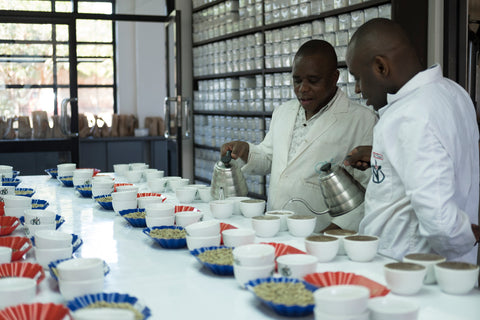
The coffees we cupped with Tropical were fantastic, and we learned that this mill is one of the largest importers of farm supplies because of the material and intellectual support they provide to the farmers who sell coffee through them at auction. They have the best retention of producers of any mill in Kenya as well. Farmers in Kenya have complete control over their coffee through the mill to the point it gets sold. Often farmers change which mill they are working with year to year. This can be one of the biggest barriers to working with the same farmers every year in Kenya.The fact that nearly all the farmers who work with Tropical Mills come to them every year is a testament to how much work they put into supporting these people. This is also crucial for us to start introducing customers here in Denver to coffees we really believe in and building that name for producers year over year.
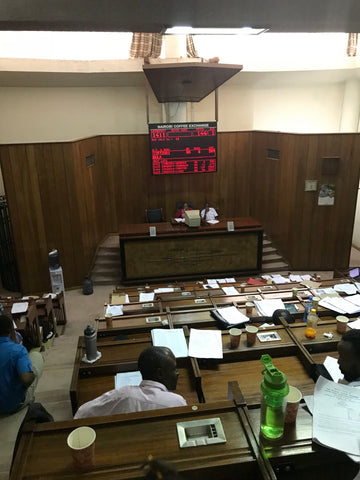
Our favorite lot this year was from Ndaroini cooperative. We had cupped nearly 200 cups in a day and a half at Tropical’s lab. The mill's cupping teams were cupping incoming samples for next weeks auction (it was a big room with lots of cupping going on) right next to us during these two days. A bit of murmuring bubbled up from the end of one table and the lab manager and head cupper, a Kenyan woman who is the ultimate decider in quality scoring, pulled us over to try an AB lot (I still remember the lot number ending in 0044) from the Nyeri district. It was unusually vibrant and rich; two of the best qualities in Kenyan coffee, and had intense red wine flavor. We asked Danilo to bid on it for us at the following weeks auction and gave him a very high reserve. We ended up paying really well for it as we weren’t the only buyers who were impressed! This is Ndaroini AB, which we will be releasing later in the year.
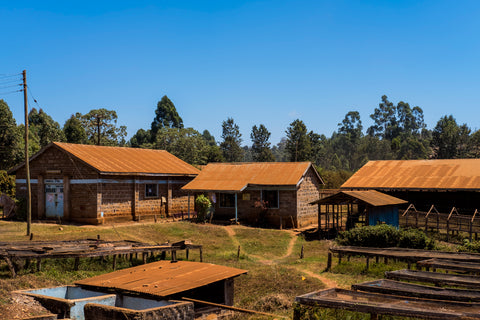
Our first coffees are also some we view as having high potential for long term relationships. Kii is a cooperative in Kirinyaga we have had our eye on for a while. A lot of the highest scoring lots at the auction the previous year were from Kii, and many of our favorites on the tables this year were consistently lots from Kii. We found our favorite lot only to learn that a Norwegian importer had purchased all but five bags. So we purchased the remainder and that will be going out in our subscription boxes next month (sign up here). The first coffee released everywhere else is Kariru PB.
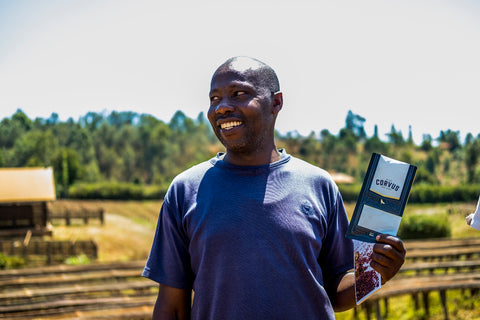
We cupped probably 100 cups of peaberry coffee, and Kariru was the best one for us. It has really explosive tropical fruit flavors, and complex florals. Visiting this cooperative was an awesome experience as well. The cooperative is part of the Gikanda Union. We met the union leaders at their offices to talk and share an afternoon coffee. As much as true coffee people here in the US want to meet the people growing the coffee, producers are equally eager to meet the people roasting their coffee. We dropped off some bags of our coffees for them; we feel like it’s important to show that we really present their coffee as being special. Showing them how the end package will look goes a long way in this regard. We felt very welcome and have no trouble envisioning working with these producers for years to come. From here we went to visit the Kariru wet mill.
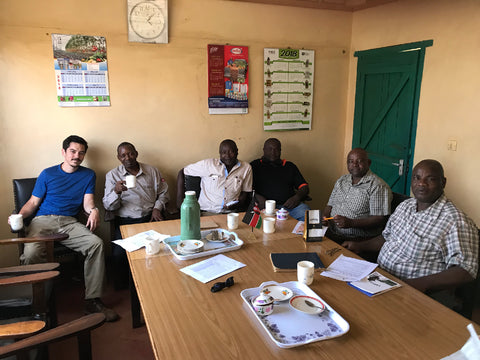
The Kariru cooperative and wet mill is at the end of a dusty red dirt road and has bright blue gates. Their mission and commitment to sustainability is in big white letters on these gates and embodies many ecological objectives. The directors of the cooperative have a focus on biodiversity and maintain large gardens for workers and swaths of native forest all around the wet mill land. Their care for the land and coffee was inspiring and we look forward to hearing customers feedback on this wonderful coffee. We will back in Nyeri and Kirinyaga this year and hope to bring them a positive report and hand them a bag of their own coffee!
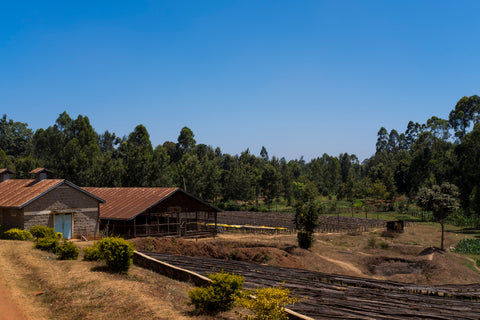

(Note: we weren’t able to visit the Ndaroini cooperative this year - look next year for pictures and more info on them)
May 10, 2024
Explore the visionary world of Jamison Savage, a former financier turned coffee pioneer, whose dedication to excellence and innovation has redefined specialty coffee. From the lush jungles of Panama, Jamison brings forth the Echo Washed Carbonic Maceration Cascara Infused Geisha—a coffee that defies convention with its unique flavors of Cabernet Grape, Lychee, and Honeysuckle. Join us on a journey where tradition meets innovation, and each sip unveils a new realm of possibilities in the world of coffee.
Sign up to get the latest on sales, new releases and more…
